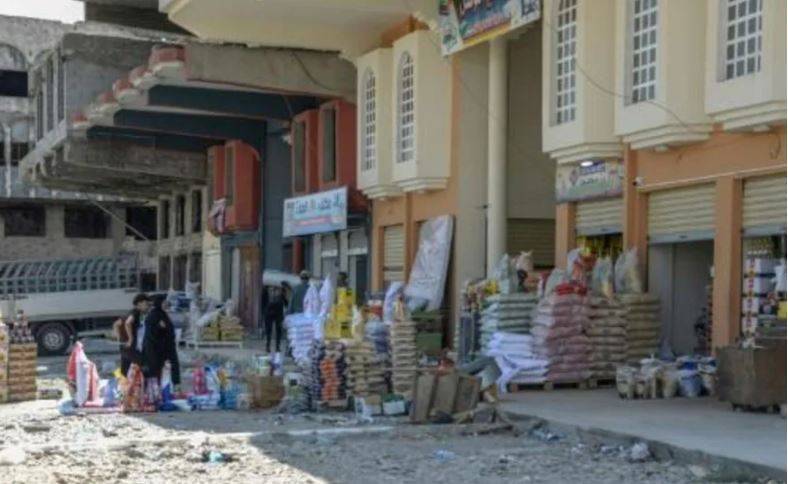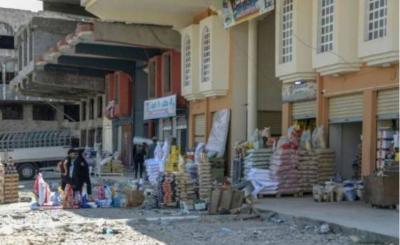Ahmad Riyad has finally returned to his shop in the Al-Kornish market in Old Mosul, which he managed to rebuild with his own funds. However, four years after the end of the war, the market remains devastated, along with other parts of the city, waiting for governmental support that has yet to arrive. From his store in the historical market of a city set to be visited by French President Emmanuel Macron on Sunday, Ahmad, 22, tells Agence France-Presse, "Life is gradually returning to our ravaged area after we rebuilt our shops at our own expense." He adds, "We have not received any government compensation or from interested organizations."
The reopened shops stand as a small oasis of life amidst a significant devastation still visible in the market, which was bustling with customers before 2014, prior to the Islamic State's takeover of the area. Today, the number of shoppers is limited and pales in comparison to the golden days, as the residents’ private resources alone are insufficient to revive the market adjacent to the old Mosul bridge and the Tigris River to its pre-war state as a vital economic artery for the region.
Ahmad explains that among about 400 shops and stalls, "only 10% have returned to operation. Many find it challenging to reopen their stores because they lack money." In the summer of 2017, official celebrations were held to mark the "liberation" of Mosul, considered the "capital" of the Islamic State, which occupied large areas of Iraq for over three years, at the hands of Iraqi forces. However, the city's residents found themselves amidst the rubble of their homes and shops.
Even today, they lack the means for reconstruction. Besides the Al-Kornish market, devastation is still evident in the historic Bab al-Saray market and the old city, which was visited by Pope Francis last March, where he prayed for the souls of "war victims." Government sources estimate that more than 80% of its infrastructure and buildings remain destroyed.
### A Meager Progress
Despite the deteriorating economic conditions, the predominantly Sunni Mosul has not witnessed protests during the wave of demonstrations in October 2019 against corruption, poverty, and mismanagement. However, its residents felt solidarity with others in Iraq, particularly in Baghdad and the south. The city's people generally feel neglected by the government due to what they perceive as excessive centralization, delaying the arrival of funds and their budget shares, especially compensation for damages caused by the war.
To date, there are over one hundred thousand claims in Nineveh for compensation submitted by those "affected by the liberation operations and the accompanying bombing and destruction of essential infrastructures," according to Mahmoud al-Akla, the director of the compensation department in the province. However, so far, "only about 2,600 claims have been compensated," while over 66,000 claims are still under review.
Said Ghanem, 40, who submitted a claim for damages to his home, stated that he has yet to receive anything. He adds to AFP, "According to our information, the compensations department in Nineveh completed the case and sent it to the relevant government departments in Baghdad, which have not provided us with compensation so far." The mayor of Mosul, Zuhair al-Araji, attributes the delay to the "Compensation Committee in Baghdad, the General Secretariat of the Cabinet, and the Ministry of Finance." He clarifies that "the reconstruction of infrastructure covers 80% of it in the city, but health-related projects are delayed, with only 30 to 40% completed."
The cost of rebuilding Nineveh, according to an official source, is estimated at $100 billion, a staggering figure compared to Iraq's state budget, which is around $90 billion for 2021.
### Job Opportunities
In the market that is slowly coming back to life, sales are rising, and with it, the number of new jobs in a country where one in five citizens is unemployed, according to official statistics. The need for these jobs today is greater than ever due to the economic crisis in Iraq, marked by the increasing exchange rate of the dollar against the dinar and rising poverty levels.
Ammar Hussein, 50, the owner of a restaurant on the nearby Al-Dawasa street, comes to the market daily to shop for his restaurant. He says, "The opening of the market shops has saved me time, effort, and distance, and their prices are very reasonable." This content was published on August 28, 2021. After the Taliban regained control of Afghanistan, Switzerland does not intend to accept more Afghan refugees despite calls from civil society.
However, that is not enough in his view. "The government should compensate the affected shop owners so they can rebuild their stores and restore the market to its former glory." Salah al-Din Hussein Ali, 64, while loading goods onto his truck, states, "Although work is not as it used to be, it is good and continuously developing." Hussein Ali transports various goods from "fabrics, hand tools, cooling equipment, and others" throughout Nineveh province from the market located in its capital, Mosul, which has historically been a major trade center and corridor for transporting goods inside and outside Iraq.
The slow pace of reconstruction prompted Prime Minister Mustafa al-Kadhimi to visit Mosul on August 16, two months before early parliamentary elections, announcing the formation of a "Mosul Reconstruction Committee" to draw a "comprehensive map and action plan." Similarly, Ali Mahmoud, 42, who previously owned a wooden furniture shop in the carpenters' market, is waiting for financial support to rebuild his store. He says, "I hope to rebuild my shop, which was my source of livelihood, and return to the area, but I do not have enough money."




